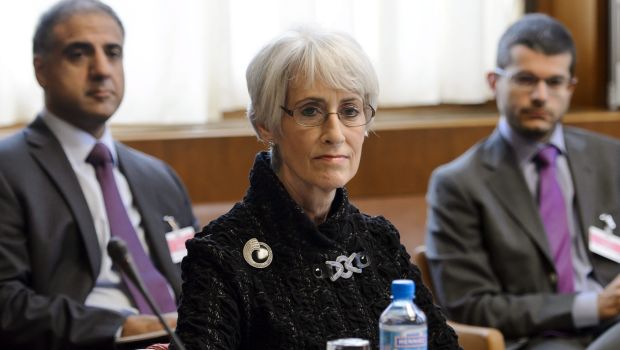
US Under Secretary for Political Affairs Wendy Sherman, center, waits for the start of the two days of closed-door nuclear talks on Tuesday, Oct. 15, 2013 at the United Nations offices in Geneva, Switzerland. (AP Photo/Fabrice Coffrini, pool)
In testimony before the US Senate on October 3, Sherman—the State Department’s lead negotiator in meetings between Iran and world powers over the country’s controversial nuclear program—said that the US would be looking for Iranian attempts to deceive its negotiating partners because “we know that deception is part of the DNA.”
In the same hearing, Sherman appealed to legislators to postpone a new round of sanctions on Iran until after the upcoming Geneva negotiations between Iran and the group of states known as the P5+1, the five permanent members of Security Council plus Germany (P5+1), scheduled for the 7 and 8 of November.
Two weeks after the hearing, fierce criticism of Sherman’s comments began to appear on Iranian media outlets affiliated with the country’s conservative political factions. On Wednesday morning, the ultra-conservative daily Kayhan demanded Iran’s nuclear negotiators withdraw from the next round of talks in Geneva if Sherman is present as part of the US delegation.
In a belated response, Iranian Foreign Ministry Spokeswoman Marziyeh Afkham said on Tuesday October 22 that “the US official’s comments not only run counter to the principle of mutual respect but indicate Sherman’s lack of knowledge about the conditions of the Iranian nation,” according to Iran’s Press TV.
Afkham, speaking to reporters in her weekly press conference, added that “resistance against any form of bullying” is part of the Iranians’ DNA.
Sherman’s comments have reportedly been re-published in more than 30 pro-conservative websites and newspapers, many in Iran’s provinces. Elsewhere in Iran, Sherman’s comment was met with outrage by Sadeq Ziba-Kalam, a vocal Iranian academic and media commentator described it as “scientifically baseless and racist.”
Within the Iranian parliament, Hossein Naghavi, and MP and member of National Security and Foreign Policy Committee also condemned Sherman’s remarks, saying “The repetition of such rhetoric by US officials will lead to the Iranian nation and government’s distrust of the US.”
In an attempt to clarify the comments attributed to Sherman, the US State Department’s Deputy Spokeswoman Marie Harf said “I think first that doubtless each side has said things that have offended the other side over the last, what, thirty years now, and each side has commented publicly on its inability to trust the other side.”
“This mistrust has deep roots, and we don’t think it can be overcome overnight, but we made some progress last week in Geneva, and we hope to continue making progress, including with additional bilateral meetings going forward,” Harf added.
Harf was asked in a press briefing on Tuesday if Sherman’s comment “was not meant to imply that President Rouhani is genetically incapable of telling the truth?”
“In no way,” Harf replied. “We’ve been very clear that we appreciate…many of the things President Rouhani has said, that we appreciate the tone coming out of him and the rest of the Iranian delegation to the P5+1, and hope to continue that tone going forward.”
The new Iranian administration under President Hassan Rouhani is under enormous domestic and external pressure to reach a deal on Iran’s nuclear program in order to reduce and ultimately remove sanctions on Iranian economy.
However, Rouhani’s recent unprecedented phone conversation with US president Barack Obama, and the face-to-face meeting of Iranian foreign minister Mohammad Javad Zarif and US Secretary of State John Kerry have already been interpreted as weakness by Iran’s conservatives, who remain suspicious of any agreement that resembles compromise or surrender to American pressure.
The Rouhani administration’s efforts have also attracted the implicit criticism from Iran’s supreme leader, Ayatollah Khamenei, indicating that his support for Rouhani’s charm offensive is conditional upon securing a deal which appears to uphold Iranian national sovereignty.
